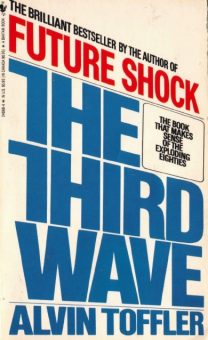THE INTELLIGENT ENVIRONMENT
According to Hald, “Home computers can already talk, interpret speech, and control appliances. Throw in a few sen-sors, a modest vocabulary, the Bell Telephone system ;nul your house could talk to … anyone or anything in tin-world.” Many obstacles still lie ahead, but the direction ol change is clear.
“Imagine,” Hald writes. “You’re at work, the phone rings. It’s Fred, your house. While monitoring the morning news n ports for stories of recent burglaries, Fred picked up a weather bulletin warning of pending heavy rain. This jogged Fred’s bubble memories to run a routine roof maintenance check. A potential leak was found. Before calling you, Fred phoned Slim for advice. Slim is a ranchstyle home down the block. . . Fred and Slim often shared data banks and each knew they were programmed with an effective search technique for identifying household services…….. You’ve learned to trust Fred’s judgment, andapprove the repairs. The rest is rather straight forward, Fred calls the roofer. “
The fantasy is funny. Yet it spookily catches the feel of life in an intelligent environment. Living in such an environment raises chilling philosophical questions. Will machines take over? Can intelligent machines, especially as they are linked together in mtercommunicating networks, outrun our ability to understand and control them? Will Big Brother some day be able to tap not merely our telephones but our toasters and television sets, keeping tabs on our every move and mood? How dependent should we allow ourselves to become on the computer and the chip? As we pump more and more intelligence into the material environment, won’t our own minds atrophy? And what happens if someone or something pulls the plug out of the wall? Will we still have the basic skills needed for survival?
For each question there are innumerable counterquestions. Can Big Brother really keep tabs on every toaster and TV set, every car engine and kitchen appliance? When intelligence is distributed widely throughout the entire environment, when it can be activated by users in a thousand places at once, when computer users can communicate with one another without going through the central computer (as they do in many distributed networks), can Big Brother still control things? Rather than enhancing the power of the tota1it:ni:m state, the decentralization of intelligence may, in fact, w it. Alternatively, won’t we be smart enough to outfox govern ment? In The Shockwave Rider, a brilliant, complex novel l>y John Brunner, the central character successfully .sahoinj-es tln-efforts of the government to impose thought control iln«>nrl<
172
Pages: 1 2 3 4 5 6 7 8 9 10 11 12 13 14 15 16 17 18 19 20 21 22 23 24 25 26 27 28 29 30 31 32 33 34 35 36 37 38 39 40 41 42 43 44 45 46 47 48 49 50 51 52 53 54 55 56 57 58 59 60 61 62 63 64 65 66 67 68 69 70 71 72 73 74 75 76 77 78 79 80 81 82 83 84 85 86 87 88 89 90 91 92 93 94 95 96 97 98 99 100 101 102 103 104 105 106 107 108 109 110 111 112 113 114 115 116 117 118 119 120 121 122 123 124 125 126 127 128 129 130 131 132 133 134 135 136 137 138 139 140 141 142 143 144 145 146 147 148 149 150 151 152 153 154 155 156 157 158 159 160 161 162 163 164 165 166 167 168 169 170 171 172 173 174 175 176 177 178 179 180 181 182 183 184 185 186 187 188 189 190 191 192 193 194 195 196 197 198 199 200 201 202 203 204 205 206 207 208 209 210 211 212 213 214 215 216 217 218 219 220 221 222 223 224 225 226 227 228 229 230 231 232 233 234 235 236 237 238 239 240 241 242 243 244 245 246 247 248 249 250 251 252 253 254 255 256 257 258 259 260 261 262 263 264 265 266 267 268 269 270 271 272 273 274 275 276 277 278 279 280 281 282 283 284 285 286 287 288 289 290 291 292 293 294 295 296 297 298 299 300 301 302 303 304 305 306 307 308 309 310 311 312 313 314 315 316 317 318 319 320 321 322 323 324 325 326 327 328 329 330 331 332 333 334 335 336 337 338 339 340 341 342 343 344 345 346 347 348 349 350 351 352 353 354 355 356 357 358 359 360 361 362 363 364 365 366 367 368 369 370 371 372 373 374 375 376 377 378 379 380 381 382 383 384 385 386 387 388 389 390 391 392 393 394 395 396 397 398 399 400 401 402 403 404 405 406 407 408 409 410 411 412 413 414 415 416 417 418 419 420 421 422 423 424 425 426 427 428 429 430




